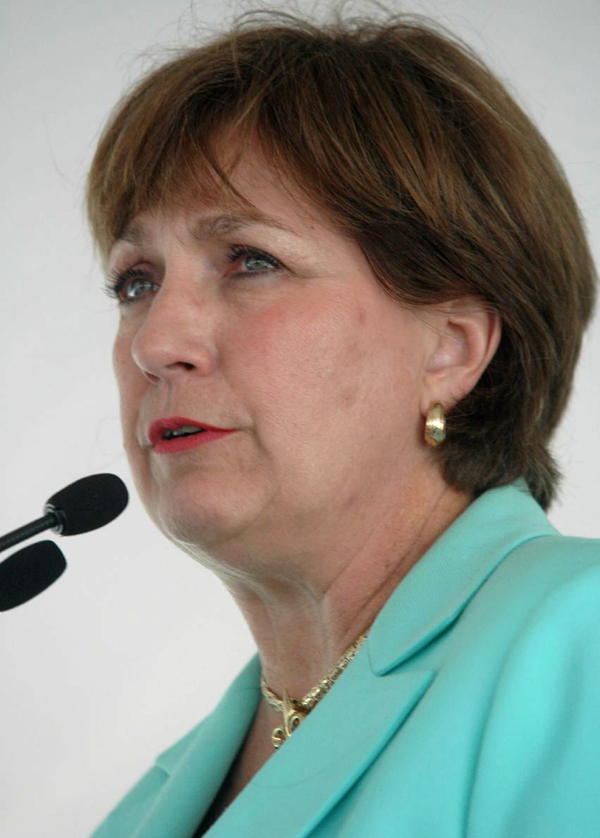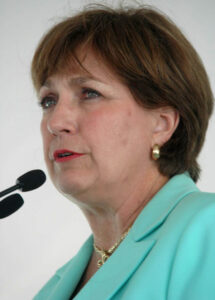Kathleen Blanco
Kathleen Blanco, Louisiana's first woman governor, served during Hurricane Katrina and its aftermath. Blanco faced extreme criticism of her handling of the disaster.

Wikimedia Commons.
A reproduction of a photograph of then Governor Kathleen Blanco speaking in St. Bernard Parish in 2006.
Kathleen Blanco was the first woman elected governor of Louisiana, serving from 2004 to 2008. Though she made inroads with education and health care during her term, Hurricane Katrina, which struck on August 29, 2005, overshadowed her governorship. Although the causes of the catastrophe and the government’s inadequate response had roots that preceded Blanco’s tenure, she received much of the blame for wide-ranging government failures.
Born on December 15, 1942, in the French-speaking Cajun village of Coteau, Kathleen Babineaux was the first of six children born to carpet cleaner Louis Babineaux and his wife, Lucille [Fremin] Babineaux. Kathleen grew up in New Iberia, about thirty miles southeast of Lafayette. Upon graduating with a BS from the University of Southwestern Louisiana (now University of Louisiana at Lafayette) in 1964, she married Raymond S. Blanco. The couple subsequently had six children. After spending the 1964–65 school year as a business education teacher at Breaux Bridge High School, she spent the next fifteen years as a stay-at-home mother. Later, Blanco joined her husband in running a market research and political polling business.
In 1984, Blanco decided to pursue political office. A Democrat, she won election as a member of the Louisiana State Legislature. She later moved on to the Louisiana Public Service Commission, where she served from 1989 to 1995. She won the first of two terms as lieutenant governor of the state in 1995, and ran for governor in 2003. Her promises of prekindergarten programs for all four-year-olds, laptop computers for seventh graders, and increased teacher salaries helped her finish second to US Rep. Bobby Jindal in the October primary. In the runoff, Blanco stressed her opponent’s youth and inexperience. She also ran advertisements that linked Jindal to the Bush administration’s support of the Central American Free Trade Agreement that would, she argued, lead to lower tariffs on imported sugar, a volatile issue in sugar-growing Louisiana. Blanco, a devout Catholic, also opposed abortion. Carrying Cajun country by a wide margin, Blanco defeated Jindal with 52 percent of the vote.
Blanco’s term began quietly. The 2005 passage of a tax on private and community hospitals to raise money for health care was among her chief achievements. Other states considered following Louisiana’s lead on this issue as way of reducing state-borne health care costs. Blanco’s success, however, was overshadowed by Hurricane Katrina, which almost wiped New Orleans and much of the Gulf Coast off the map. Blanco, faced with arguably the worst crisis that has ever confronted a Louisiana governor, struggled to respond. Her rejection of President George W. Bush’s offer to federalize the Louisiana National Guard office proved controversial, and many argued that the Road Home Program she implemented to distribute federal aid after the storm was inefficient at best. Blanco was also forced to deal with Hurricane Rita, a Category 3 storm that heavily damaged southwestern Louisiana a mere 26 days after Katrina’s landfall.
Time magazine condemned Blanco as “dazed and unsteady” in the aftermath of Katrina, while others questioned her hurricane preparation and timing in requesting federal assistance. Some, including Blanco, saw sexism in the widespread criticism of her leadership and her displays of emotion. It should be noted that other politicians also struggled to address this unprecedented disaster and that no other U.S. governor has had to formulate a response to the sudden collapse of a major city.
Blanco publicly acknowledged failures at every level of government and accepted full responsibility for Louisiana’s ineffectual response to the disaster. She then fought hard for federal help and collaborated with the Louisiana Recovery Authority to obtain additional monies for housing relief. She also filed suit against the federal government in August 2006, hoping to force it to use taxes collected from Louisiana’s oil and natural gas industry to shore up the Louisiana coastline. Loss of coastal buffer areas had been cited as one of the reasons why Katrina proved so damaging. By 2007, the challenges of dealing with hurricane recovery and political partisanship had worn down the governor. On March 20, 2007, Blanco announced that she would not seek reelection. In her televised speech, she said, “While so many still suffer, I am choosing to do what I believe is best for my state. I will focus my time and my energy for the next nine months on the people’s work, not on politics. After much thought and prayer, I have decided I will not seek re-election as your governor.”
In 2019, the University of Louisiana at Lafayette opened the Kathleen Babineaux Blanco Public Policy Center on its campus. Blanco died of cancer on August 18, 2019, just weeks after the center’s opening.
